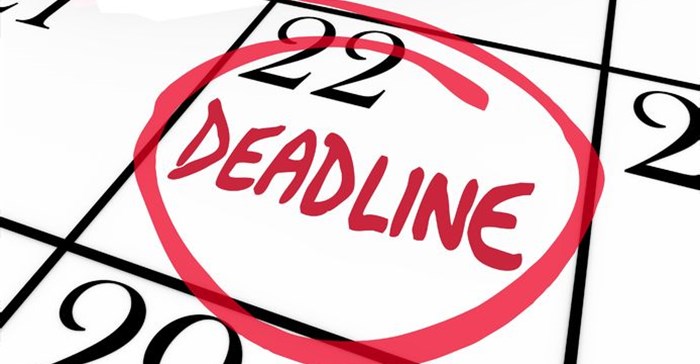What is a deadline? A deadline is a description of a specific time and date or period (usually) set in the future.
It is a prediction of when specific projects are to be complete. Whilst a deadline may signal the coming to an end of a project, the truth is, a deadline is simply a knife over everyone’s neck ‘to get going’. Literally, if you miss it, you die. The world comes to an end. Not
Deadlines are not the end of life. They are constructs of false reality. A deadline is a timeframe thought of by another human being. More often than not, deadlines are just arbitrary. They are necessary to complete projects, but do not necessarily influence the quality of work.
Deadlines are sometimes missed (because they are not real), and if they are met, most often than not, they are met with low quality, low par, average output or end products. This is especially true in business, schools and governments, with particular emphasis on advertising agencies. People always miss deadlines. So why have deadlines? Well, they encourage progress on projects, jobs, what needs to be done and general life. But what if we want more than just moving along and meeting a deadline?
Are you familiar with the saying; “We have to meet our deadline?” Whilst this may sound noble and like the right thing to do, it puts emphasis on the time, and not necessarily the task, project nor even the process to getting to the end goal. What ends up happening is that we focus on time and getting to the finish line with something, paying less attention to how we get there, what we get there with, and the quality therein.
Fortunately, it’s possible to manage deadlines in a way that affords you the opportunity to focus on what is important – what matters – what you have to deliver and not necessarily when to deliver it. ‘When’ is important, but not as important as ‘what’ you have to deliver. An extra day or two crafting and finessing will add tremendous value to the end-product.
Add lifelines to your deadlines
Within the framework of your deadlines, I think that it is essential to add lifelines. Lifelines are questions asked in order to improve the quality of the end-product at the end of each deadline or set timeframe. Lifelines add overall value into the process.
For example, in the case of social media posts, if the objective is to post three or four times a week, that being the deadline or timeframe in which to meet a deadline, lifeline questions would be: “Do we really need to post that many times a week? What can we do differently? Does it really matter how many times we post?”
In the case of launching a new product, the deadline being to launch “as soon as possible”, or saying arbitrarily “18 August 2016”, a possible lifeline would be: “What will happen if we postpone our launch by two weeks and make sure that we mitigate all possible risks and finesse the quality of the launch?” Sometimes, asking why can be critical. “Why that date? Seeing the task at hand, I would think that we are going to need more time.”
In the case of having to prepare a presentation for a client, arbitrarily so, in as little time as possible, a lifeline in this instance would be: “Can we ask the client for a bit more time, seeing that we are struggling to come up with proper solutions?”
A lifeline will help save your reputation, time, money and energy on unnecessary reverts. A lifeline indicates that there is some level of calm, and that not everyone is panicking. A lifeline helps strengthen the relationship between client and agency.
Lifelines are essential as they help improve the quality of end products at the end of deadlines.
The next time you are panicking about a deadline, instead of trying to force everything into trying to meet the deadline, rather throw in a lifeline is the form of a question or suggestion and focus on what matters: the process and the end-product. A delayed project with a superior end-product is better that a rushed and mediocre end-product at the end of a project or campaign.
Lifelines help you put some #Respek on your craft.







































